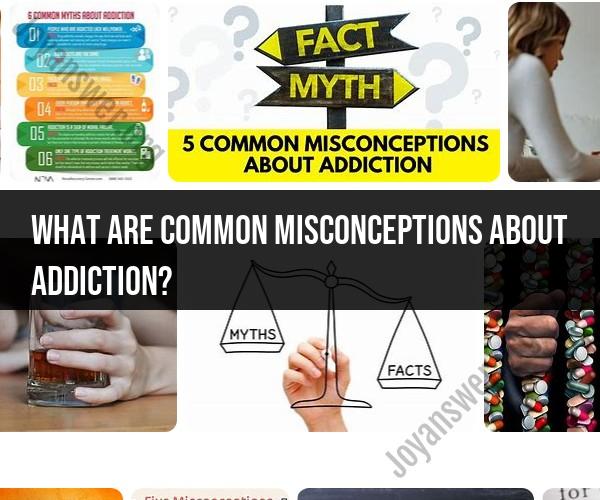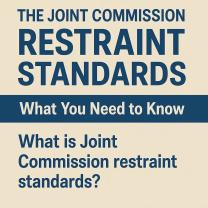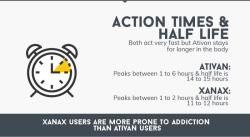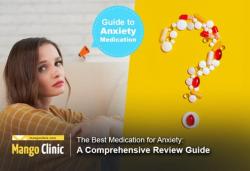What are common misconceptions about addiction?
Misconceptions about addiction are widespread, and addressing these myths is important for promoting a better understanding of this complex issue. Here are some common misconceptions about addiction:
Addiction is a Choice: One of the most pervasive myths is that people with addiction can simply choose to stop using drugs or engaging in addictive behaviors. In reality, addiction involves changes in the brain that affect decision-making and self-control, making it extremely challenging to quit.
Moral Weakness: Addiction is not a sign of moral weakness or a lack of willpower. It is a medical condition that affects the brain's reward and pleasure centers, leading to compulsive behaviors.
Addiction is Only About Substance Use: While substance addiction (e.g., drugs and alcohol) is well-known, addiction can also involve behaviors such as gambling, gaming, or overeating. The underlying mechanisms of addiction are similar, regardless of the substance or behavior involved.
Addiction is a Problem of "Bad" People: Addiction can affect anyone, regardless of their background or moral character. It is not limited to a specific group of individuals.
You Can Spot an Addict by Their Appearance: Addiction is not always obvious, and many people with addiction maintain a facade of normalcy. Stereotypes about what an "addict" looks like can lead to missed opportunities for help.
Addicts Can Quit Cold Turkey: Quitting addictive substances or behaviors "cold turkey" can be dangerous, especially with certain substances like alcohol or opioids. Medical supervision and treatment are often necessary.
Recovery is a One-Time Event: Recovery from addiction is an ongoing process and may involve relapses. It's not a one-time event but a journey that often requires continued support and treatment.
Shaming and Punishment are Effective Solutions: Stigmatizing or punishing individuals with addiction does not help them recover. It can, in fact, make the situation worse by increasing feelings of isolation and hopelessness.
Addiction is a Short-Term Problem: Addiction is a chronic condition that can persist for years or a lifetime. It requires long-term management and support.
Addicts are Hopeless Cases: With the right treatment and support, many individuals with addiction can and do recover. It's essential to provide hope and encouragement to those seeking help.
Addiction is a Choice That Begins with the First Use: Not everyone who tries a substance becomes addicted. Genetics, environment, and other factors play a significant role in determining who is at risk for addiction.
Treatment is Ineffective: Treatment for addiction can be highly effective. There are various evidence-based approaches, and many individuals achieve and maintain recovery with the right support.
People with Addiction Lack Motivation to Quit: Many people with addiction want to quit but struggle due to the physical and psychological grip of the condition. Motivation alone is often not sufficient to overcome addiction.
Addressing these misconceptions is crucial to reduce stigma, promote early intervention, and support individuals on their path to recovery. Addiction is a complex issue that requires a compassionate and evidence-based approach to treatment and prevention.
Common Misconceptions About Addiction: Debunking Myths
- Myth: Addiction is a choice.
Fact: Addiction is a chronic disease that changes the brain and makes it difficult to control cravings and use of drugs or alcohol.
- Myth: Only weak people get addicted.
Fact: Anyone can become addicted, regardless of their age, race, gender, or socioeconomic status.
- Myth: Addiction is hopeless.
Fact: There are many effective treatments available for addiction, and many people are able to recover and live full and productive lives.
- Myth: People with addiction are lazy and unmotivated.
Fact: People with addiction are often struggling with a complex disease that affects their brain and behavior. They may be motivated to change, but they may need help to do so.
- Myth: People with addiction can just stop using if they want to.
Fact: Addiction is a complex disease that can be difficult to overcome without treatment. People with addiction may experience cravings and withdrawal symptoms that make it difficult to stop using drugs or alcohol.
The Stigma Surrounding Addiction and Its Impact
The stigma surrounding addiction can have a devastating impact on people who are struggling. It can prevent them from seeking help, and it can make it difficult for them to maintain relationships and employment.
Stigma can also lead to discrimination against people with addiction and their families. For example, people with addiction may have difficulty finding housing or employment, and their children may be bullied or ostracized.
Clarifying Misunderstandings About the Nature of Addiction
Addiction is a complex disease that involves multiple brain regions and circuits. It is not simply a matter of willpower or weakness.
Addiction changes the brain in ways that make it difficult to control cravings and use of drugs or alcohol. It can also lead to changes in other brain regions and circuits, including those involved in learning, memory, decision-making, and impulse control.
Raising Awareness and Promoting Understanding of Addiction
It is important to raise awareness and promote understanding of addiction in order to reduce stigma and help people who are struggling.
We can all help to raise awareness and promote understanding of addiction by:
- Educating ourselves about addiction
- Talking to our loved ones about addiction
- Supporting people with addiction in their recovery
- Advocating for policies that make addiction treatment more accessible and affordable
The Importance of Evidence-Based Information on Addiction
It is important to rely on evidence-based information when learning about addiction. This means getting information from reputable sources, such as medical journals and government websites.
There is a lot of misinformation about addiction circulating on the internet and in the media. It is important to be critical of the information you see and to only rely on sources that are credible and up-to-date.
Evidence-based information is important because it can help us to:
- Understand the nature of addiction
- Make informed decisions about treatment
- Support people with addiction in their recovery
We can all help to promote evidence-based information on addiction by sharing information from reputable sources and by challenging misinformation when we see it.













